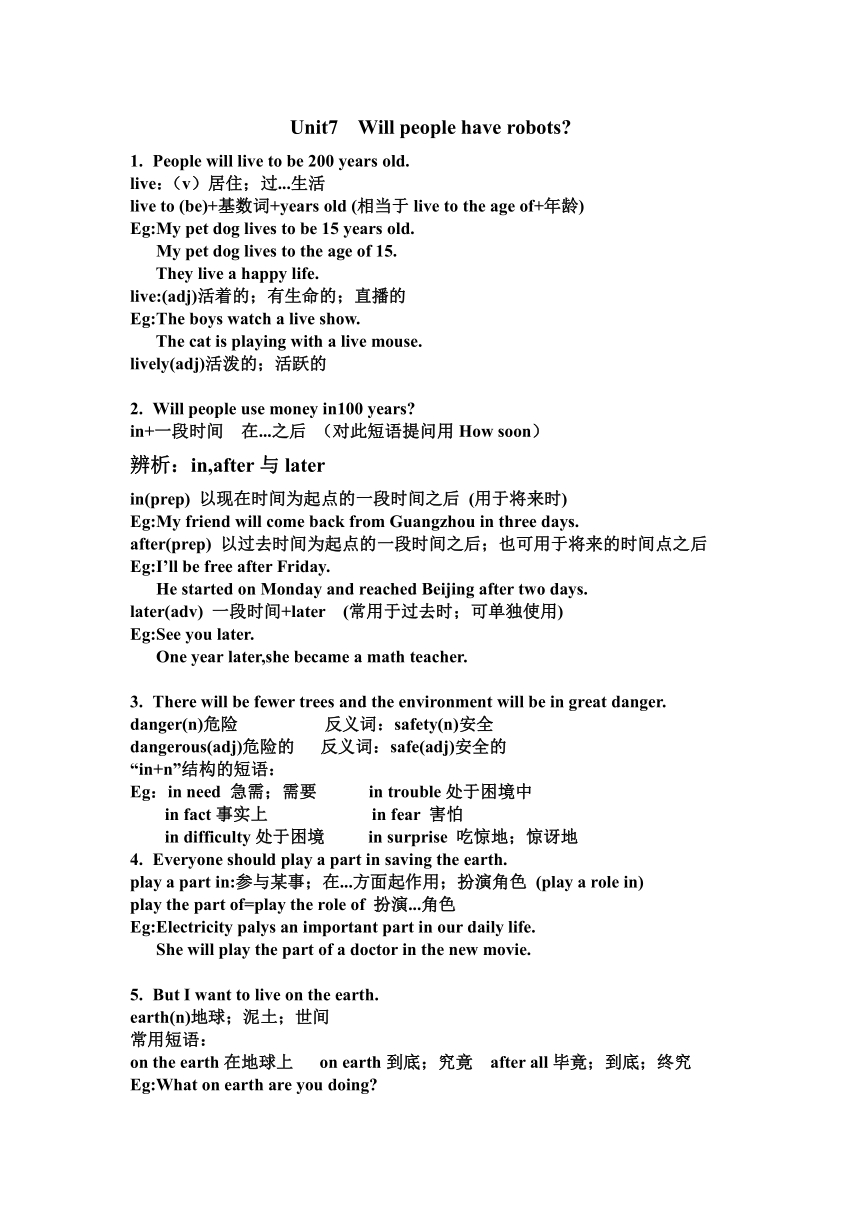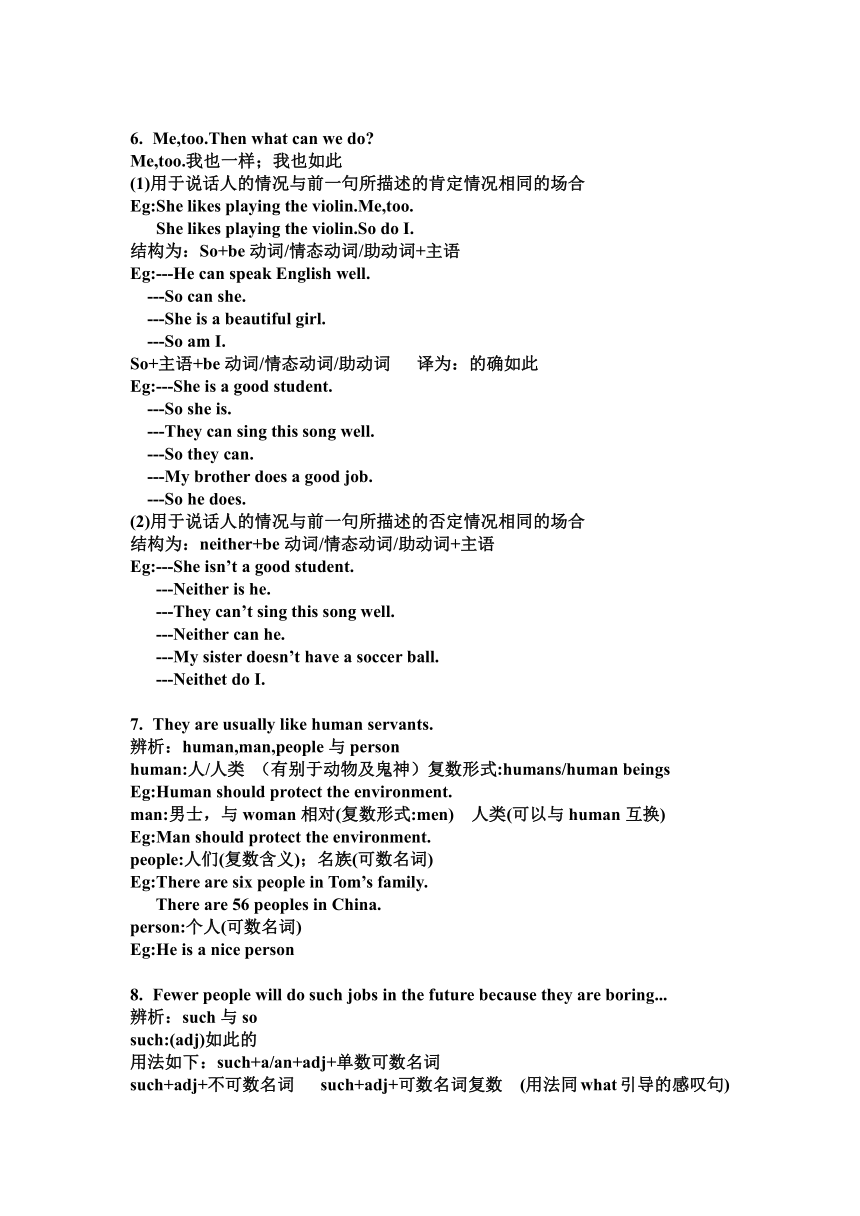人教版八年级上册Unit7 Will people have robots?知识点
文档属性
| 名称 | 人教版八年级上册Unit7 Will people have robots?知识点 |  | |
| 格式 | docx | ||
| 文件大小 | 24.0KB | ||
| 资源类型 | 教案 | ||
| 版本资源 | 人教新目标(Go for it)版 | ||
| 科目 | 英语 | ||
| 更新时间 | 2024-01-11 21:19:03 | ||
图片预览


文档简介
Unit7 Will people have robots
People will live to be 200 years old.
live:(v)居住;过...生活
live to (be)+基数词+years old (相当于live to the age of+年龄)
Eg:My pet dog lives to be 15 years old.
My pet dog lives to the age of 15.
They live a happy life.
live:(adj)活着的;有生命的;直播的
Eg:The boys watch a live show.
The cat is playing with a live mouse.
lively(adj)活泼的;活跃的
Will people use money in100 years
in+一段时间 在...之后 (对此短语提问用How soon)
辨析:in,after与later
in(prep) 以现在时间为起点的一段时间之后 (用于将来时)
Eg:My friend will come back from Guangzhou in three days.
after(prep) 以过去时间为起点的一段时间之后;也可用于将来的时间点之后
Eg:I’ll be free after Friday.
He started on Monday and reached Beijing after two days.
later(adv) 一段时间+later (常用于过去时;可单独使用)
Eg:See you later.
One year later,she became a math teacher.
There will be fewer trees and the environment will be in great danger.
danger(n)危险 反义词:safety(n)安全
dangerous(adj)危险的 反义词:safe(adj)安全的
“in+n”结构的短语:
Eg:in need 急需;需要 in trouble处于困境中
in fact事实上 in fear 害怕
in difficulty处于困境 in surprise 吃惊地;惊讶地
Everyone should play a part in saving the earth.
play a part in:参与某事;在...方面起作用;扮演角色 (play a role in)
play the part of=play the role of 扮演...角色
Eg:Electricity palys an important part in our daily life.
She will play the part of a doctor in the new movie.
But I want to live on the earth.
earth(n)地球;泥土;世间
常用短语:
on the earth在地球上 on earth到底;究竟 after all毕竟;到底;终究
Eg:What on earth are you doing
Me,too.Then what can we do
Me,too.我也一样;我也如此
(1)用于说话人的情况与前一句所描述的肯定情况相同的场合
Eg:She likes playing the violin.Me,too.
She likes playing the violin.So do I.
结构为:So+be动词/情态动词/助动词+主语
Eg:---He can speak English well.
---So can she.
---She is a beautiful girl.
---So am I.
So+主语+be动词/情态动词/助动词 译为:的确如此
Eg:---She is a good student.
---So she is.
---They can sing this song well.
---So they can.
---My brother does a good job.
---So he does.
(2)用于说话人的情况与前一句所描述的否定情况相同的场合
结构为:neither+be动词/情态动词/助动词+主语
Eg:---She isn’t a good student.
---Neither is he.
---They can’t sing this song well.
---Neither can he.
---My sister doesn’t have a soccer ball.
---Neithet do I.
They are usually like human servants.
辨析:human,man,people与person
human:人/人类 (有别于动物及鬼神)复数形式:humans/human beings
Eg:Human should protect the environment.
man:男士,与woman相对(复数形式:men) 人类(可以与human互换)
Eg:Man should protect the environment.
people:人们(复数含义);名族(可数名词)
Eg:There are six people in Tom’s family.
There are 56 peoples in China.
person:个人(可数名词)
Eg:He is a nice person
Fewer people will do such jobs in the future because they are boring...
辨析:such与so
such:(adj)如此的
用法如下:such+a/an+adj+单数可数名词
such+adj+不可数名词 such+adj+可数名词复数 (用法同what引导的感叹句)
Eg:I never want such a boring holiday again.
I have met many such friendly people.
so:(adv)如此
用法如下:
So+adj+a/an+单数可数名词
So+adj/adv+that+从句 如此...以致于
名词前有many,much,few,little修饰时,应用so,即:so+many/much/few/little+n+that+从句
Eg:It was so warm a day that they went swimming.
He was so tired that he fell asleep soon.
The student did so little homework that made his teacher angry.
However,some scientists believe that although we can make robots move like people.
believe(vt)相信
believe常用短语:
believe sb.相信某人(所说的话是真的)
believe in sb.信任某人
Eg:I believe him,but I can’t believe in him.
以believe引导的宾语从句,若主句的主语为第一人称(I/we),那么反义疑问句部分的主语及谓语动词与从句的主谓保持一致。
Eg:We believe that Tom is a good boy,isn’t he
I don’t believe that I can be a good teacher,can I
However,they agree it may take hundreds of years.
agree:(v)同意;赞成
用法如下:
agree with sb.on/about sth.在某方面同意某人的观点
Eg:I don’t agree with Mary on/about many things.
agree to+plan/idea/suggestion/arrangement 同意某计划/观点/建议/安排
Eg:We agree to this arrangement.
agree to do sth.同意/答应做某事
Eg:They agree to give it to me.
If buildings fall down with people inside...
fall(vi) 落下;跌落
Eg:The little boy fell into the river.
fall(系动词) 进入(新的或不同的状态)(接adj作表语)
Eg:fall asleep 入睡 fall ill生病
fall(n)秋天 相当于autumn(多用于英式英语)
与fall相关的短语:
fall into 落入;陷入 fall off 跌落;摔下 fall ill生病
fall down倒下 fall over摔倒 fall behind落后
fall asleep 入睡 fall in love with 爱上
So I’ll probably just keep a bird.
probably:(adv)很可能;大概(位于句首、实义动词前、系动词/助动词/情态动词后)
Eg:Probably I will go home soon.
It is probably the last plane for Kunming.
辨析:probably,possibly,perhaps,maybe
probably/possibly/perhaps/maybe 大概;或许;可能
probably:可能性较大
possibly:可能性较小,强调客观存在的可能
perhaps:其含义和用法与maybe一样,多用于口语
maybe:可能性较大,较口语化,常置于句首
语气从强到弱依次是:probably,perhaps,maybe,possibly
Will构成的一般将来时
一般将来时表示将来某个时间要发生的动作或存在的状态,也表示将来经常或反复发生的动作
时间标志词:tomorrow,the day after tomorrow,next week(month/year),in the future,in+时间
结构:
肯定式:主语+will/shall+动原+其他.
will适用于各种人称 shall常用于第一人称
Eg: We will/shall visit Beijing next month.
He will come to visit you tomorrow.
否定式:主语+will/shall+not+动原+其他.(will not=won’t shall not不能缩写)
Eg: I’ll go to the museum on Sunday,but my parents won’t go with me.
一般疑问句:Shall/Will+主语+动原+其他?
Eg:Will the students go to the zoo
Shall we go to see the movie this afternoon
辨析:will与shall
在表示 “带意愿色彩的将来”时,常用will
Eg:I will tell you the truth soon.
在询问对方是否愿意,或表示客气的邀请时,常用will
Eg:Will you send me a letter when you arrives in Beijing
Will you come to my birthday party tonight
在书面语中,主语为第一人称(I/We)时,常用shall (口语中可以替换成will)
Eg:I shall call you as soon as possible.
We shall be glad to see you.
在表示建议或征求对方意见时,可用shall
Eg:Shall we leave for Guangzhou tomorrow
Shall we get enough food
Will 与be going to 表示将来的区别
be going to表示近期、眼下就要发生的事情;will表示的将来时间则较远一些
Eg:She is going to write a letter to her mom tonight.(近期)
be going to表示根据主观判断将来要发生的事情;will表示客观上将来要发生的事情
Eg:He doesn’t fell well.He is going to be ill.(主观判断)
The quality of life will improve day by day.(客观判断)
be going to含有 “计划、准备”的意思,而will则没有
Eg:He will be here in half an hour.(不含计划之意)
My family is going to visit the Great Wall on Spring Festival.
在条件状语从句中,主语多用will引导
Eg:If it doesn’t rain tomorrow,we will go to have a picnic.
There be句型的将来时
结构:
肯定式:
There will be+主语+其他. 将会有...
There is/are going to be+主语+其他.
Eg:There will be a wonderful talented show tonight.
There are going to be more trees in this park.
否定式:
There won’t be+主语+其他.
There isn’t/aren’t going to be+主语+其他.
疑问式:
---Will there be+主语+其他?
---Yes,there will./ No,there won’t.
---Is/Are there going to be +主语+其他?
---Yes,there is/are. No,there isn’t/aren’t.
People will live to be 200 years old.
live:(v)居住;过...生活
live to (be)+基数词+years old (相当于live to the age of+年龄)
Eg:My pet dog lives to be 15 years old.
My pet dog lives to the age of 15.
They live a happy life.
live:(adj)活着的;有生命的;直播的
Eg:The boys watch a live show.
The cat is playing with a live mouse.
lively(adj)活泼的;活跃的
Will people use money in100 years
in+一段时间 在...之后 (对此短语提问用How soon)
辨析:in,after与later
in(prep) 以现在时间为起点的一段时间之后 (用于将来时)
Eg:My friend will come back from Guangzhou in three days.
after(prep) 以过去时间为起点的一段时间之后;也可用于将来的时间点之后
Eg:I’ll be free after Friday.
He started on Monday and reached Beijing after two days.
later(adv) 一段时间+later (常用于过去时;可单独使用)
Eg:See you later.
One year later,she became a math teacher.
There will be fewer trees and the environment will be in great danger.
danger(n)危险 反义词:safety(n)安全
dangerous(adj)危险的 反义词:safe(adj)安全的
“in+n”结构的短语:
Eg:in need 急需;需要 in trouble处于困境中
in fact事实上 in fear 害怕
in difficulty处于困境 in surprise 吃惊地;惊讶地
Everyone should play a part in saving the earth.
play a part in:参与某事;在...方面起作用;扮演角色 (play a role in)
play the part of=play the role of 扮演...角色
Eg:Electricity palys an important part in our daily life.
She will play the part of a doctor in the new movie.
But I want to live on the earth.
earth(n)地球;泥土;世间
常用短语:
on the earth在地球上 on earth到底;究竟 after all毕竟;到底;终究
Eg:What on earth are you doing
Me,too.Then what can we do
Me,too.我也一样;我也如此
(1)用于说话人的情况与前一句所描述的肯定情况相同的场合
Eg:She likes playing the violin.Me,too.
She likes playing the violin.So do I.
结构为:So+be动词/情态动词/助动词+主语
Eg:---He can speak English well.
---So can she.
---She is a beautiful girl.
---So am I.
So+主语+be动词/情态动词/助动词 译为:的确如此
Eg:---She is a good student.
---So she is.
---They can sing this song well.
---So they can.
---My brother does a good job.
---So he does.
(2)用于说话人的情况与前一句所描述的否定情况相同的场合
结构为:neither+be动词/情态动词/助动词+主语
Eg:---She isn’t a good student.
---Neither is he.
---They can’t sing this song well.
---Neither can he.
---My sister doesn’t have a soccer ball.
---Neithet do I.
They are usually like human servants.
辨析:human,man,people与person
human:人/人类 (有别于动物及鬼神)复数形式:humans/human beings
Eg:Human should protect the environment.
man:男士,与woman相对(复数形式:men) 人类(可以与human互换)
Eg:Man should protect the environment.
people:人们(复数含义);名族(可数名词)
Eg:There are six people in Tom’s family.
There are 56 peoples in China.
person:个人(可数名词)
Eg:He is a nice person
Fewer people will do such jobs in the future because they are boring...
辨析:such与so
such:(adj)如此的
用法如下:such+a/an+adj+单数可数名词
such+adj+不可数名词 such+adj+可数名词复数 (用法同what引导的感叹句)
Eg:I never want such a boring holiday again.
I have met many such friendly people.
so:(adv)如此
用法如下:
So+adj+a/an+单数可数名词
So+adj/adv+that+从句 如此...以致于
名词前有many,much,few,little修饰时,应用so,即:so+many/much/few/little+n+that+从句
Eg:It was so warm a day that they went swimming.
He was so tired that he fell asleep soon.
The student did so little homework that made his teacher angry.
However,some scientists believe that although we can make robots move like people.
believe(vt)相信
believe常用短语:
believe sb.相信某人(所说的话是真的)
believe in sb.信任某人
Eg:I believe him,but I can’t believe in him.
以believe引导的宾语从句,若主句的主语为第一人称(I/we),那么反义疑问句部分的主语及谓语动词与从句的主谓保持一致。
Eg:We believe that Tom is a good boy,isn’t he
I don’t believe that I can be a good teacher,can I
However,they agree it may take hundreds of years.
agree:(v)同意;赞成
用法如下:
agree with sb.on/about sth.在某方面同意某人的观点
Eg:I don’t agree with Mary on/about many things.
agree to+plan/idea/suggestion/arrangement 同意某计划/观点/建议/安排
Eg:We agree to this arrangement.
agree to do sth.同意/答应做某事
Eg:They agree to give it to me.
If buildings fall down with people inside...
fall(vi) 落下;跌落
Eg:The little boy fell into the river.
fall(系动词) 进入(新的或不同的状态)(接adj作表语)
Eg:fall asleep 入睡 fall ill生病
fall(n)秋天 相当于autumn(多用于英式英语)
与fall相关的短语:
fall into 落入;陷入 fall off 跌落;摔下 fall ill生病
fall down倒下 fall over摔倒 fall behind落后
fall asleep 入睡 fall in love with 爱上
So I’ll probably just keep a bird.
probably:(adv)很可能;大概(位于句首、实义动词前、系动词/助动词/情态动词后)
Eg:Probably I will go home soon.
It is probably the last plane for Kunming.
辨析:probably,possibly,perhaps,maybe
probably/possibly/perhaps/maybe 大概;或许;可能
probably:可能性较大
possibly:可能性较小,强调客观存在的可能
perhaps:其含义和用法与maybe一样,多用于口语
maybe:可能性较大,较口语化,常置于句首
语气从强到弱依次是:probably,perhaps,maybe,possibly
Will构成的一般将来时
一般将来时表示将来某个时间要发生的动作或存在的状态,也表示将来经常或反复发生的动作
时间标志词:tomorrow,the day after tomorrow,next week(month/year),in the future,in+时间
结构:
肯定式:主语+will/shall+动原+其他.
will适用于各种人称 shall常用于第一人称
Eg: We will/shall visit Beijing next month.
He will come to visit you tomorrow.
否定式:主语+will/shall+not+动原+其他.(will not=won’t shall not不能缩写)
Eg: I’ll go to the museum on Sunday,but my parents won’t go with me.
一般疑问句:Shall/Will+主语+动原+其他?
Eg:Will the students go to the zoo
Shall we go to see the movie this afternoon
辨析:will与shall
在表示 “带意愿色彩的将来”时,常用will
Eg:I will tell you the truth soon.
在询问对方是否愿意,或表示客气的邀请时,常用will
Eg:Will you send me a letter when you arrives in Beijing
Will you come to my birthday party tonight
在书面语中,主语为第一人称(I/We)时,常用shall (口语中可以替换成will)
Eg:I shall call you as soon as possible.
We shall be glad to see you.
在表示建议或征求对方意见时,可用shall
Eg:Shall we leave for Guangzhou tomorrow
Shall we get enough food
Will 与be going to 表示将来的区别
be going to表示近期、眼下就要发生的事情;will表示的将来时间则较远一些
Eg:She is going to write a letter to her mom tonight.(近期)
be going to表示根据主观判断将来要发生的事情;will表示客观上将来要发生的事情
Eg:He doesn’t fell well.He is going to be ill.(主观判断)
The quality of life will improve day by day.(客观判断)
be going to含有 “计划、准备”的意思,而will则没有
Eg:He will be here in half an hour.(不含计划之意)
My family is going to visit the Great Wall on Spring Festival.
在条件状语从句中,主语多用will引导
Eg:If it doesn’t rain tomorrow,we will go to have a picnic.
There be句型的将来时
结构:
肯定式:
There will be+主语+其他. 将会有...
There is/are going to be+主语+其他.
Eg:There will be a wonderful talented show tonight.
There are going to be more trees in this park.
否定式:
There won’t be+主语+其他.
There isn’t/aren’t going to be+主语+其他.
疑问式:
---Will there be+主语+其他?
---Yes,there will./ No,there won’t.
---Is/Are there going to be +主语+其他?
---Yes,there is/are. No,there isn’t/aren’t.
同课章节目录
- Unit 1 Where did you go on vacation?
- Section A
- Section B
- Unit 2 How often do you exercise?
- Section A
- Section B
- Unit 3 I'm more outgoing than my sister.
- Section A
- Section B
- Unit 4 What's the best movie theater?
- Section A
- Section B
- Unit 5 Do you want to watch a game show?
- Section A
- Section B
- Unit 6 I'm going to study computer science.
- Section A
- Section B
- Unit 7 Will people have robots?
- Section A
- Section B
- Unit 8 How do you make a banana milk shake?
- Section A
- Section B
- Unit 9 Can you come to my party?
- Section A
- Section B
- Unit 10 If you go to the party, you'll have a grea
- Section A
- Section B
